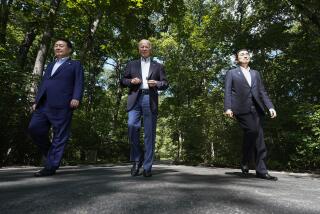A Terribly Lopsided Summit Table
- Share via
Summits, unlike beauty contests, don’t ordinarily involve a vote for Miss Congeniality. That’s a good thing, especially if you’re Japan, which has been looking for a permanent seat on the U.N. Security Council and considering a higher military profile in Asia. Had there been such a silly category at the summit photo-op and group gathering in Denver this past weekend, Miss Tokyo would not have been the betting favorite.
Japan is notorious for achieving trade advantages over almost everybody, one quality that garners few points for popularity. Then there is its annoying penchant for raising Asian issues: The so-called “Summit of the Eight” included only one nation from Asia, but that didn’t stop Japan from trying to induce the seven non-Asian summiteers to focus on what they would do if North Korea were to blow up, or blow across the demilitarized zone into South Korea, or launch missiles at Japan. No one wanted to talk about it. “As far as the Korean Peninsula is concerned,” a senior Japanese official told me Sunday, trying to be polite but scarcely masking disappointment, “there wasn’t the time to talk about it.”
So, if not the personality award for Tokyo, then how about the reality trophy? At least the Japanese raised the issue of why Russia had been invited, courted and all but canonized, when of course China was out of sight and almost out of mind except for Hong Kong. The summiteers must have lost sight of the fact that Russia sports an economy that can at best be described as pre-pubescent, whereas China has one the World Bank says will some day outsize even America’s. All they had to say about China was the predictable, glib, grandstanding warning about behaving itself during and after the Hong Kong takeover later this month. “Other than that, China was sort of a hidden agenda,” laughed the senior Japanese official. “Its future participation at such a summit was in fact not discussed, but at the same time Prime Minister Hashimoto very often would say he would like to see the early participation of China in the World Trade Organization and more of China in the international system. We intended to discuss the subject more, but unfortunately there wasn’t enough time.” Again.
One shudders to think how truly lame the Denver confab might have been without even one Asian representative there. And, if there can only be one--an absurdity, of course--it might as well be Japan, which is beginning to emerge from the diplomatic doldrums to seek a larger role on the world stage.
Japan longs for that permanent U.N. Security Council seat so much that it looks poised to accept a larger military assignment in Asia from America. This pleases Washington and much of Asia, as long as that tether to America doesn’t snap. But China fears that Japan and America will gang up to narrow China’s range of options, especially in the event of a blowup over Taiwan. Adds the senior Japanese official: “Japan still would be entitled to say yes or no in the event America asks for assistance in a crisis over Taiwan. We have explained this to China. It’s not automatic.” Not automatic, right; but now possible. That’s what has China on edge. And Japan’s public, too. Wall Street Journal correspondent Jacob Schlesinger, who used to cover Tokyo, puts it this way in his extraordinary new book, “Shadow Shoguns: The Rise and Fall of Japan’s Postwar Political Machine:” “[Japanese] public opinion remains a check on any sharp increase in foreign activity; 50 years after World War II, much of the Japanese populace, fearing a return to the militarism of the 1930s, continues to be wary of any expanded role for the armed forces.”
Wisely, the Hashimoto government, with its fragile parliamentary coalition, is not rushing things and is not asking for trouble. So, while wariness is warranted, close-mindedness is not. I hope both Japanese and Chinese skeptics will grant the Hashimoto government the necessary breathing space to prove that Japan is no longer the feared sleeping monster whose potential awakening causes other Asians to toss and turn at night. Indeed, the new generation of talent coming up behind Hashimoto deserves the chance to transform Japan from a nation claustrophobic to a nation transcendent.
The lesson of Denver is that without major Asian representation, there can be no world summit worthy of the appellation; and that without Japan pushing itself to the top table, the West just might forget to invite anyone from that other half of the world. The Hashimoto government, while perhaps having won no popularity contests, returns to Tokyo having made important points about the world that Denver otherwise all but forgot.
Times columnist Tom Plate is also a professor of policy and communication studies at UCLA. E-mail: [email protected]
More to Read
Sign up for Essential California
The most important California stories and recommendations in your inbox every morning.
You may occasionally receive promotional content from the Los Angeles Times.










